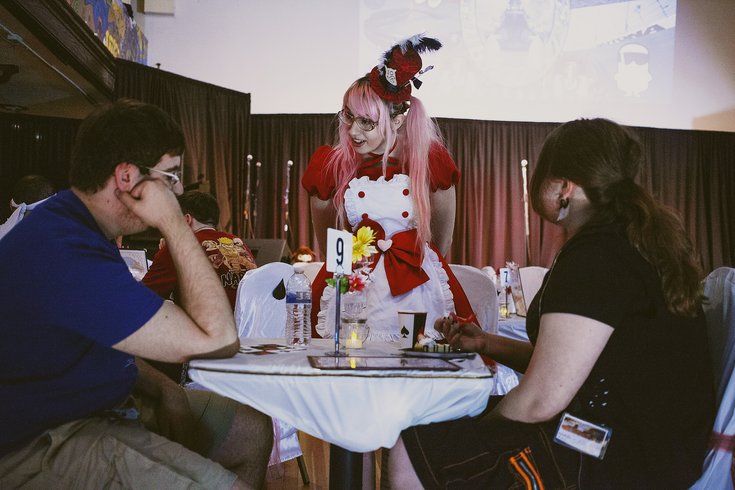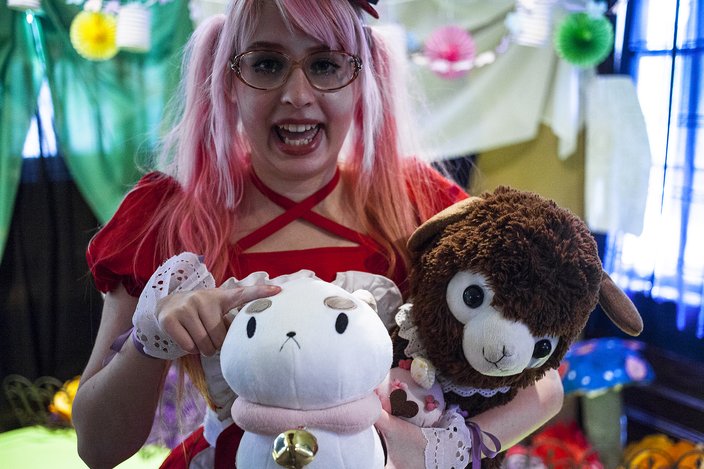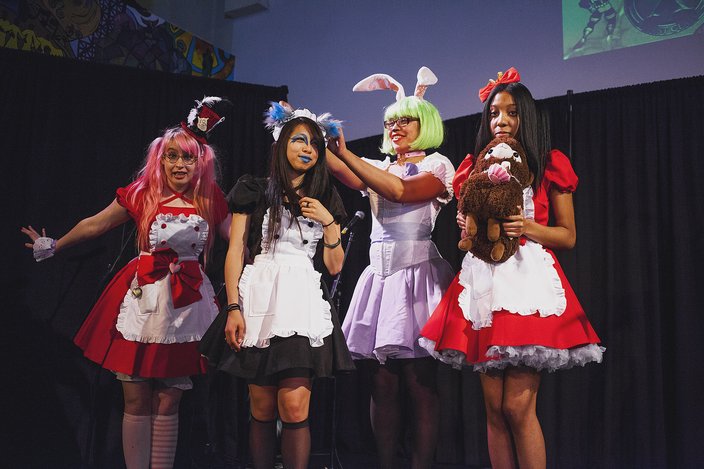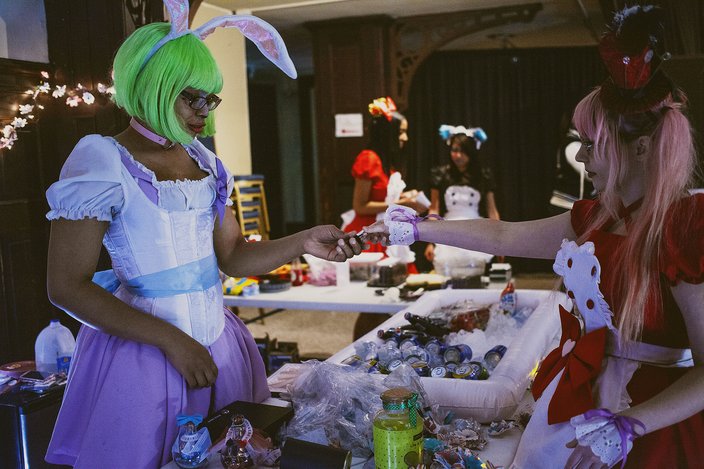
May 29, 2015
 Christopher Fascenelli/for PhillyVoice
Christopher Fascenelli/for PhillyVoice
"Chibi," a maid for Moe Maid Cafe, greets two customers at the Takii video game and anime convention in University City.
"Welcome home, Master!"
With a tip-tap, tip-tap, the waitress steps to the table and opens her arms in a gesture of warmth and welcome. An up-down scan reveals a maid's petticoat swept by her pink pigtailed hair, which is cherry-topped with a miniature, feather-adorned top hat. Around her waist, an apron hangs to the bottom of her knee-length skirt, its ends tied tightly at her waist in a tidy (and oh-so-big) bow that clutches the crook of her back.
In a swift movement, chipper in sheer presence, she floats to the other side of the table to pull out a chair wrapped with pink ribbon. She motions to sit, grabs a notepad and -- like any other waitress of the world about to serve up a burger or slice of pie -- lifts an eyebrow in anticipation of an order.
Welcome to Moe Maid Cafe, found not in Tokyo or Kyoto, but Philadelphia.
If the very concept of a maid cafe is a mystery to you, that's probably because they're practically unheard of in the United States -- let alone in Philadelphia. Most whither as quickly as they sprout; Maid Cafe NY, the nearest of them to Philly, permanently closed after a year.
But whether that's because they're poorly run or poorly understood is anyone's guess.
Maid cafes are restaurants with sweet treats served up by equally saccharine "maids," or cosplayers-turned-waitresses who engage in role-playing. Customers are, traditionally, greeted at the door by a lineup of maids who have smiles permanently plastered on their faces and exclaim a greeting that uses the word "master."
Maid cafes, like Moe Maid, use themed props to build atmosphere. Christopher Fascenelli / PhillyVoice
And, yes, let's get this out of the way up front: There's absolutely, positively, most definitely something sexual about maids dishing desserts while using subservient language like "master."
The concept originates from Japanese culture -- a particular section of Tokyo called Akihabara that's known for harboring "Otaku" culture. Or, to put it colloquially, "geek culture." But Otaku is a particular brand of that culture that partly takes cues from visual novels that are pornographic -- porn with plot.
Many of those plots involve -- you guessed right -- maids.
"Generally, the male protagonist has a lot of women to choose from who he can ‘court’ throughout the story, and always there’s a main character who’s really sweet, gentle, innocent and eager to please the male protagonist," Kathryn Hemmenn, a professor of Japanese pop culture at George Mason University, told PhillyVoice. "There are different explanations, but it’s part of Otaku culture and the anime and manga surrounding this culture. But I think a lot of the appeal is they’re meant to serve you – they treat you like you are nobility or returning home. That’s the fantasy they play.”
Critical mass for maid cafes in Japan happened around 2001, Hemmenn said, when DVDs, video games, and the Internet ushered in broader audiences for anime and manga. That's the year the first maid cafe sprung up in the district; today, there are more than 200 in the country.
They have since started on a downward trajectory in Japan, she said, giving way to more generalized cafe concepts like the by-now-notorious cat cafe. But all the while, maid cafes have spread to places like Mexico, London and New York.
In the process of proliferating, though, maid cafes lost any sense of clear-cut identity.
"It’s a limited clientele, and [at its peak] people were competing to see who could offer the weirdest service, or the maid that hated or loved you most, depending on your preference," she says. "Different cafes offer different services, so some will offer you almost a one-on-one therapy session – 90 minutes with the maid or butler of your choice. And a lot of them are also just regular cafes, where they happen to be cosplaying."
In which case, maid cafes might be rooted in sexuality, but mainstream application -- especially outside of Japan -- is altogether different. The fantasy is often second fiddle.
"It’s not that you just go into this place and ogle the girls," she adds. "Men go in alone, women go in alone and there are groups of tourists who go into these things and some of these maid cafes stay open late into the evening and you find alcohol and college students treating it like a bar. For some people, there is this sexual element of it, but I think it’s also just part of a shared social, cultural experience."
Four of the maids on stage at Taaki convention. The maids perform choreographed dances to K-pop and J-pop for customers. Christopher Fascenelli / PhillyVoice
Moe Maid Cafe, a LLC, is Philadelphia's aspiring maid cafe -- one of those social, cultural-import experiences. It was founded in 2013 by Tajaun Penn, a 25-year-old from North Philadelphia who's a pastry chef and line cook at Valley Forge Casino's Viviano. It began as a way to offer a fresh experience to Philadelphia convention-goers as well as spread word about her desserts. But over time, the cafe, which she funds with money from her day job, evolved from what she calls a "professional hobby" to a serious business venture.
Moe Maid is, for now, a pop-up-only cafe that's primarily housed by local anime and video game conventions like J1 Convention (where they'll be this weekend) and Takii. The maids, of which there are five, design themed cafe sets together, perform dances to K-pop and J-pop, serve sweet treats baked by Penn and take time to chat and play games -- actual games like Jenga or Ladders -- with patrons as if they're pals-for-rent.
The cafe's manager, Samantha Ayala, is quick to shoot down the more exploitive suspicions of what her maids do in the cafe.
“A lot of misconceptions come from Japan," Ayala told PhillyVoice. "Some of the services they give there, you get hand massages, and you can even take a maid out for a walk in Japan. Here, we're trying to be different.”
For starters, the cafe has explicit rules for its guests. There's no grabbing, photography without permission or disclosing of real names. The maid outfits are also decidedly more toned-down.
"The cons we’ve gone to, guys are conservative and polite enough to not [get handsy], but we do have a security guard if things do get out of hand, just in case," Stephanie Boi, a maid for the cafe, told PhillyVoice. "But I am aware of things -- 'Maybe I should be weary of this person.' And I look out for other girls, because they're carefree and trusting and I quietly watch. But it's not like I carry pepper spray or anything."
To boot, the cafe covers themes that range from Japanese anime, to Korean pop culture to "Frozen." It's also a mixed-race staff, atypical of maid cafes.In short, Moe Maid Cafe is as fusion as any recent culinary experience in Philadelphia, both thematically and in how it operates.
Maids Brianna and Chibi at work, serving "mocktails" and desserts made by Moe Maid owner Tajaun Penn, including cupcakes and a rose-shaped cinnamon apple roll. Christopher Fascenelli / PhillyVoice
"I do Americanize the experience a bit," Penn told PhillyVoice. "So, even with 'Alice in Wonderland' [as a theme], you come into a maid cafe and it fits, right off the bat. But I won’t go as far as '50 Shades of Grey.'”
Part of making it a business venture here, of course, also means toning down the intimacy of the traditional experience.
“We live in America, and we have this thing called ‘personal boundaries,’" Penn teases.
To plan her business, she says she's paid attention to what other maid cafes have succeeded and failed with, and is attempting to create an atmosphere that doesn't scare off tourists or passersby. Ideally, she'd like a Victorian house and open windows to invite such a crowd.
But there are lots of reasons why she's not rushing into opening a brick and mortar, most of which are problems any new business faces.
"Philadelphia is ready for a maid café, but the problem I face is, ‘Where do I want to put it? What part of the city makes you money?'" Penn says. "We would put it in a college campus, because those are the people who will come out, but there are six major colleges in Philadelphia in the Center City area, and now I have to figure out [which one will work]."
Location and a loyal-but-not-lucrative niche following are what's so far kept her from opening a physical space.
And, she says frankly, the simple lack of willingness of others to try and see past the maid outfits -- what may be her biggest obstacle if and when she decides to open shop.
"Older generations -- in general -- don’t understand the concept of dressing up. It's, ‘You’re too old for this, go get a real job,’ -- those types of people. They don’t understand it,” Penn says. "But people shouldn't be afraid to ask a question; they shouldn't be afraid to understand what they don't understand."


